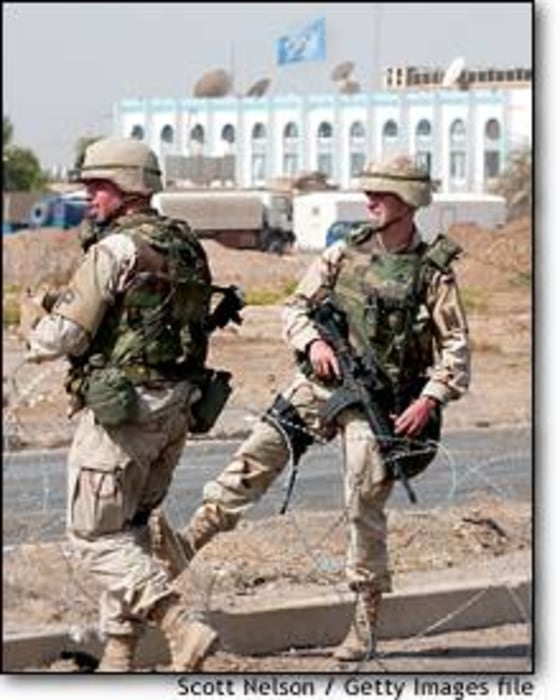The United Nations said on Friday its decision to pull out more international staff from Iraq because of security fears would not affect the day-to-day running of its humanitarian programs. Although its decision to reduce staff is a setback to President Bush’s efforts to expand the U.N.’s role in Iraqi reconstruction in order to attract more nations to contribute cash and troops, Secretary of State Colin Powell claimed some success in forging a consensus on nation-building.
The organizations's 4,000 Iraqi staff would take on the mantle as they had done throughout the U.S.-led war which deposed Saddam Hussein in April, said a U.N. spokeswoman in Baghdad.
“The U.N. will go on with its work,” Veronique Taveau told Reuters. “We are committed to our humanitarian work and we are not stopping our programs. Our national staff did a great job during the war and they will do it again.”
Reeling from two deadly bomb attacks at its Baghdad headquarters, the United Nations said on Thursday it had begun pulling some expatriate staff out of Iraq and more withdrawals would follow.
Taveau said around one third of 42 international staff in Baghdad would leave over the next few days to work from Jordan and Cyprus.
U.N. Secretary-General Kofi Annan has agonized over staff safety since an August 19 suicide bomb attack on the U.N. building in Baghdad which killed 22 people including head of mission Sergio Vieira de Mello. A second bomb attack on the compound on Monday killed an Iraqi policeman and injured 19.
“We cannot go on like this,” Taveau said. “But the U.N. is not pulling out of Iraq. We are committed to the work we are doing here.”
The U.N. has been steadily reducing international staffing levels in Baghdad since the August bombing when more than 300 expatriate workers were based in the capital.
Taveau said the latest withdrawal was a temporary measure and would be reassessed daily.
The United Nations has humanitarian programs across Iraq, the largest being the distribution of food rations to every household under the oil-for-food program. It also has water, health and education projects.
POWELL CLAIMS SOME SUCCESS
Though there were no outward signs that President Bush’s U.N. speech and two days of personal diplomacy had softened resistance to his postwar strategy for Iraq, Powell claimed some success on Thursday.
“We are seeing some convergence of views,” he said after meeting with the foreign ministers of Britain, France, Russia and China.
In the days ahead, Powell said, the Bush administration “will be looking at language” to alter a proposed U.S. resolution that has been stalemated by objections that the United States was not willing to yield sufficient authority to the United Nations.
Powell made his move to break the stalemate at a luncheon with U.N. Secretary-General Kofi Annan and the four foreign ministers. He also met with members of the Iraq Governing Council. He said they did not settle on a timetable for an end to the U.S. occupation and transfer to civilian rule, but the anti-Saddam Hussein Iraqis “are working on it.”
Agreement on the timetable for the transition, he said, could take weeks or even months.
France and its supporters, by contrast, are insisting on an early end to the U.S. occupation and have resisted the resolution and its attempt to attract contributions of peacekeeping troops and financial support for Iraq under U.S. auspices.
‘NARROWING THE GAP’
Powell said he would like to see Iraqis take over security of their country, but they needed more training. “Intention without capability does not take us anywhere,” he said.
Adnan Pachachi, a former Iraqi foreign minister and member of the anti-Saddam Hussein council, said afterward that “we are making progress. We are narrowing the gap.”
Powell’s assessment of progress after Bush’s appeal for international assistance was more upbeat than the prognosis issued earlier in the day by an unidentified senior U.S. official.
The official, who spoke with the Associated Press on condition of anonymity, said that resistance to the go-slow approach to sovereignty advocated by U.S. officials had been so stiff that Bush did not solicit contributions from the leaders of France, Germany, India and Pakistan during private meetings, and none was volunteered. Powell also discussed the possibility of Turkish peacekeepers with Foreign Minister Abdullah Gul without getting a clear commitment, said the official.
Administration officials had hoped to reach a consensus on the U.S. resolution before Bush spoke Tuesday to the General Assembly. But work was halted, and while talks have resumed, a senior U.S. official said Wednesday it may take a month to work out a solution.
